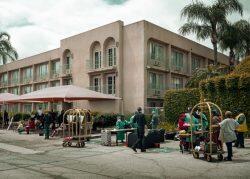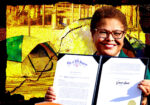Five years ago Alexander Moradi celebrated one of L.A.’s buzziest hospitality openings in recent memory.
In its first incarnation, the Mayfair Hotel had been a symbol of 1920’s-era West Coast glamor, even hosting the first-ever Oscars afterparty. By the time Moradi’s ICO Group bought it, in 2014, the property ranked among the city’s oldest hotels. It had grown shabby, but Moradi spent years renovating it with a Roaring Twenties-inspired interior design and a spruced-up ballroom fit for influencer-worthy weddings. Soon after the hotel’s 2018 reopening, some 1,500 guests crowded into its lobby for a splashy contemporary art event. Dozens more would fill the rooftop pool deck for Afrobeat parties.
“We see this as a luxury type experience,” Moradi told the L.A. Downtown News that year, “at a very affordable rate.”
Now, the Mayfair is transforming again. The L.A. City Council approved a deal last week to purchase the 294-key hotel for $60 million and convert it into a permanent homeless shelter. The high-profile public-private deal comes after a tumultuous two-year period in which the city rented the hotel as part of a pandemic-era shelter program, running up $11.5 million in damages in the process. It also amounts to a victory for L.A. Mayor Karen Bass, who advocated for the purchase despite pushback.
Kung fu developer
The deal puts a new spotlight on Moradi, a veteran L.A. commercial real estate player who, considering his status, has remained surprisingly under the radar, rarely appearing in media reports even as he has spent decades at the helm of a firm whose portfolio now stretches to 3 million square feet, with a range of multifamily, office, retail and industrial properties around California and the Southwest, including numerous buildings leased by local government agencies.
That firm, ICO Group of Companies, grew out of ICO Investment Group, a company that dates back decades and was led by Alexander’s father Isaac. The elder Moradi, a member of L.A.’s prominent Iranian Jewish community, purchased an ownership stake in Big Sky Ranch, the sprawling Simi Valley movie ranch used to film “Men in Black,” “Coming to America” and “Little House on the Prairie.”
The younger Moradi is now in his 50s and holds a business degree from USC, where he majored in real estate finance. He also holds a black belt in Shaolin kung fu, the martial arts style made popular by “Mortal Kombat” protagonist Liu Kang.
He used both qualifications in 2011, when sparring sessions at the gym led to a partnership with Patrice Rozat, a German-born restaurant manager who would go on to take the top spot at Mr. Chow in Las Vegas.
“We had been training in martial arts for years and never talked about business before,” Rozat later told the L.A. Downtown News. “We were just beating each other up.”
With another partner, the team opened Artisan House, an upscale restaurant, bar and market that quickly became one of Downtown L.A.’s trendiest venues. The 150-seat house, which has since closed, was located on the ground floor of the Pacific Electric Building, an ornate, 500,000-square-foot former train depot and Beaux Arts office building that was L.A.’s largest building when it went up in 1905.
A century later, under Moradi, ICO Group transformed the historic property, located on Main Street a few blocks west of Skid Row, into a luxury apartment complex where studios now go for more than $2,000 per month. The conversion still counts as one of the city’s most significant adaptive reuse projects and helped usher in Downtown L.A.’s famous early 21st-century urban revival.
“We feel that the time is right,” Moradi told the L.A. Times in 2002, “for downtown Los Angeles to be a 24-hour city.”
Political donor
The project also helped set a course for ICO Group and its young exec, who would go on to develop more commercial projects in economically distressed parts of town. ICO claims that one, a $107 million Class A office building it built for the county in 2007, “represents the largest real estate development project built in South Los Angeles in over 50 years.”
Like many L.A. developers, Moradi is a frequent political donor, with contributions dating back to at least the year 2000; he has since donated to more than two dozen L.A. City Council and mayoral efforts, including recent campaigns by Kevin de León, the now scandal-marked Downtown L.A. representative, and the state assemblymember Miguel Santiago, who recently announced a bid to challenge de León for the same seat.
Moradi does not appear to have donated to Bass or Eunisses Hernandez, the new council member for District 1, where the Mayfair is located. Hernandez has expressed concerns about the hotel deal, but ultimately voted for it.
Moradi and ICO came out well anyway. Before the sale was approved, the city had already agreed to pay the $11.5 million damages bill. That brings the total payment to ICO to $71.5 million — or almost $2 million over ICO’s listing price last fall — at a time when SoCal’s hotel sales are the driest they’ve been in at least 20 years.
Five years after the Mayfair’s grand reopening, Moradi might just be celebrating again.
Read more



